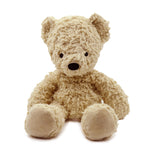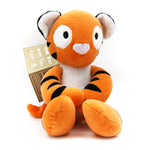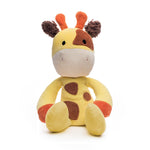Although many brands these days claim to be organic, sustainable, or ethical, their products may be far from it. It is becoming common for companies to “greenwash” their goods by adding labels like “eco friendly” or “all natural.” These labels may have no real certifications, standards, or evidence to back them up.
Bears for Humanity chooses to do things differently. Our stuffed animals are created with 100% certified organic cotton and are made in small artisanal workshops that meet ethical sourcing standards. Our products carry certifications that are backed by reputable agencies that require the most stringent testing.
Recently, Bears for Humanity founder Vijay Prathap spent two weeks in India visiting the facilities where our special plushies are made. These trips are a fundamental part of Bears for Humanity’s mission to be an honest, ethical, and eco friendly brand.
The Dark Side of the Toy Industry
A teddy bear should be a token of comfort for a child. Unfortunately, the countries that create most mass-produced toys have few ethical or environmental regulations. Toys from these places are damaging for the Earth, the people that make them, and ultimately the children that play with them.
The majority of big-name stuffed animal manufacturers care very little about being eco friendly, and continue to use polyester to make their toys. The production of polyester plastics results in large amounts of pollution and a product that will take hundreds of years to decompose. In many countries, manufacturers are not required by law to disclose the chemicals used to create their toys, or the negative environmental impacts from their production. Therefore, many toys are falsely advertised and sold as “organic” or “green.”
The social consequences of the overseas toy industry are just as concerning as the environmental. Many factories rely on contract labor which means employees may work extremely long hours with no weekend or vacation time. One investigation found that during the holiday season, workers in some Chinese factories worked as many as 175 overtime hours per month.
Laborers often face dangerous working conditions and exposure to toxic chemicals like flame retardants that are necessary when working with polyester. The same investigation mentioned above found that workers were not given the necessary training to know how to protect themselves from the toxic chemicals they work with. It also showed that employers failed to provide their employees with protective equipment necessary to ensure their safety.
An Eco Friendly Brand Making Toys Differently

Bears for Humanity was built according to a three-part socially conscious business model. First, each bear is guaranteed to be safe and organic. Secondly, bears for Humanity will donate one bear for each sold. Lastly, the company strives to bring safe and fair jobs to those who need them most.
“Our core, fundamental mission is to uplift people from poverty by creating fair living wage jobs,” Vijay shared. Making regular trips to meet with workshop employees, co-ops, and safety testing representatives is a core factor in ensuring that Bears for Humanity continues to be an ethical and eco friendly brand.
In his recent trip to India, Vijay spent two weeks “engaging, reconnecting, and re-energizing” the Bears for Humanity production community. Prior to the pandemic, Vijay made these trips every quarter, but this was the first trip he was able to take in two years due to travel restrictions. “I observed a lot of new energy. I observed relief,” he said.
He noted that workers are excited that things in India are slowly returning to normal and business continues to pick up. Amazingly, Bears for Humanity did not release a single employee during the pandemic. This was not an easy feat, and required the company to take a substantial financial hit. “It is a personal sacrifice when you have a private company, it’s a choice. In India there is no government program to help,” Vijay explained.

Our Sustainable Supply Chain
In reality, nothing is easy about committing to be an ethical and eco friendly brand. Bears for Humanity has taken the time to choose supply chain partners that can provide a high level of accountability and commitment to creating the safest plushie possible.
During his trip, Vijay met with members of the Bears for Humanity supply chain, including representatives from the co-ops that grow the cotton, the men and women who cut, sew, and dye the bears, and safety testing agencies. Unlike polyester products that can be produced in a single factory, working with 100% organic cotton takes a lot of time and must pass through various stages before it becomes teddy bear fur.
Each step of this process presents an opportunity for contamination, so the cotton is tested at various stages of production. Each test can cost between $4,000-$5,000. “This is why organics are so expensive. We get separate tests done for each step of production - soil, dyes, cotton, etc., as well as final safety tests,” Vijay shared. The result is a completely clean, safe, and hypoallergenic plushie toy that even the most sensitive child can enjoy.
Bears for Humanity stuffed animals also provide safe and fair jobs for the men and women who create them. “We don’t have contract employees. To me, that’s a fundamental of ethical sourcing. No contract employees,” explained Vijay. “We offer a guaranteed salary, weekends off, vacation time. We don’t do double shifts. It is uncommon in the world, we are uncommon.”
A Better Bear for All
When Vijay and his wife, Renju, started Bears for Humanity, they had a very clear vision of the eco friendly brand they wished to create. As parents themselves, they vowed to design a safe and lovable teddy bear in a way that simply wasn’t being done. The journey to build a better bear hasn’t been easy, but the result has changed the lives of many.
Bears for Humanity’s unique plushies are pushing the limits of what we will accept for our children by providing an exceptionally safe stuffed animal. They are also protecting our Earth and reducing the amount of toxic waste and environmental destruction caused by the synthetic textile industry. In India, Bears for Humanity workers and employees are offered work that prioritizes their safety and lifts them out of poverty. In the next two years, Bears for Humanity also aims to move some production back to rural parts of the US to provide the same safe and fair working conditions to communities there.




